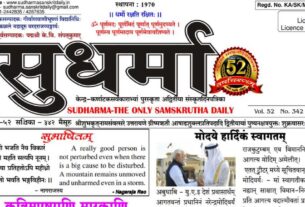In addition, they have to cancel any old age pension they might have access to. More communities will be included soon under the newly announced art pension, say officials.
Buta Kola performers have to cancel their old age pension to claim the art pension of Rs. 2,000 which was recently announced after the success of the Kannada movie, Kantara. Officials said that even after cancellation, the art pension could take a year or two to be processed.
Dayananda, a former president of Tulu Sahitya Academy and a Buta Kola performer said that there were only 20 performers of the Daivaradhne ritual in his area who actually practice Bhuta Kola art form. “We do not eat anything while performing Daivaradhane, and don’t even attend nature’s call for as long as twelve hours. Moreover, we go through a very complex process to perform the rituals, which reduces our life span too. I appreciate that the government has taken the initiative of offering Rs. 2,000 in pension for the performers but it is applicable to people above 58 years only.”
He also said that the performers receiving the old age pensions have to cancel it if they want to receive the art pension of Rs. 2000. “We have written applications to the government to allow the old age pension along with the announced art pension and reduce the age limit to at least 50 years to support and preserve our culture. Also, we are making efforts to add more people who are moving out for other job opportunities,” Dayananda added.
Another performer, Balakrishna Kattalsar, who is an associate of Dayananda, said, “Many performers among us do not even have an acre of land, and we merely earn Rs. 5,000 to 7,000 through these performances.” He also said that there were performers who were not educated and worked as labourers or coolies, and the delay in the art pension after the cancellation of the old-age pension was likely to create financial complications for them.
Ancy, a resident of Mangalore, said, “During my childhood, I used to see the performers on almost every occasion in the village. However, as people become more interested in technology, they are less likely to invite them.” She also said that over the year, people have shifted to the Yakshagana art form and migrated to other jobs due to lack of opportunities at their places.
Jagadish, an admin of the Heritage Tulunadu page on Instagram, said that the technological influence would be there, but it should be determined how this could have a positive impact on our culture and traditions. “We all are making use of Facebook, Instagram, and other social media platforms to promote our culture,” he added.
An official from the Kannada and Culture department, Kannada Bhawan, said that a person can only avail one pension at a time, so to claim the pension for the arts, the person has to cancel the old age pension. “A year ago, the pension value was just Rs. 150 which has now been increased to Rs. 2000. The announced pension for buta kola performers, however, could take a year or two, after the cancellation of old age pension, because their population is unknown. “Applicants will be verified through a process, and only people over the age of 58 will be considered,” he said.
“We have written a letter to our Kannada and Culture Minister, V. Sunil Kumar to include more art forms like Yakshagana and Kambala to get the benefits of the newly announced pension scheme. It will be announced very soon as the file has been moved to the higher authority,” said the official.
Dr.Triveni, an associate professor and a history researcher at Mangalore University, said that providing monetary support could not be the only measure to support the culture.”We need more platforms to encourage these people morally; also, the government should conduct competitions and include other communities too, as Karnataka itself has many cultures, and we have to encourage, cooperate with, and support all the art forms.”




